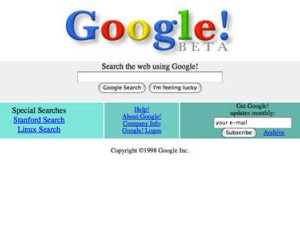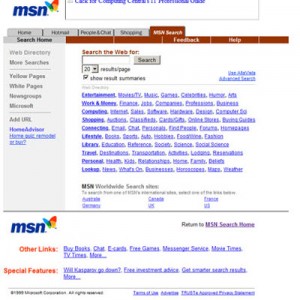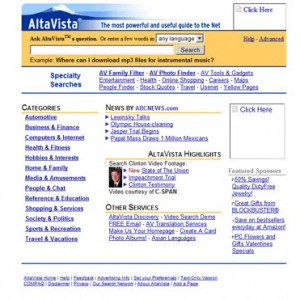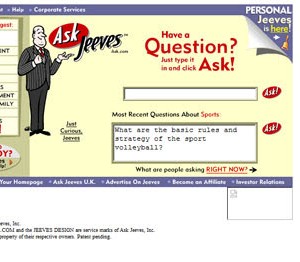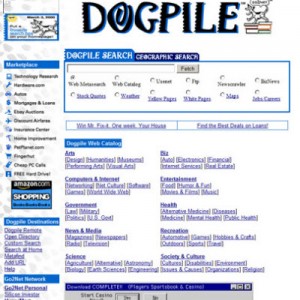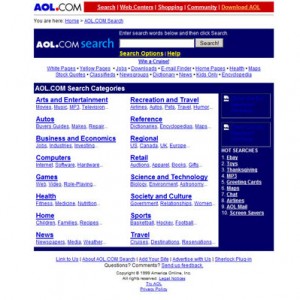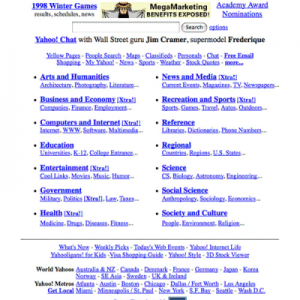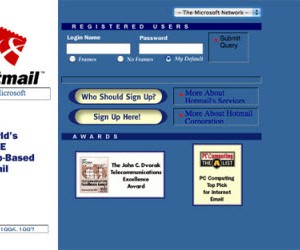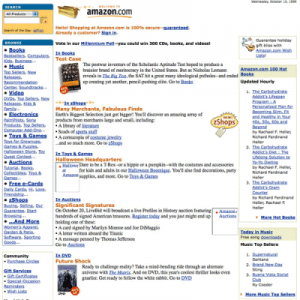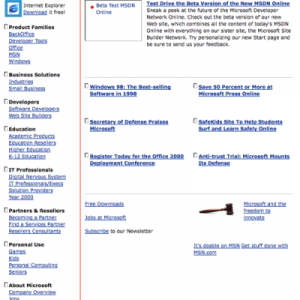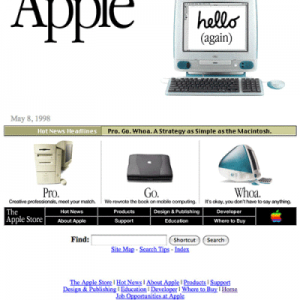As Catalyst Turns 16, We look Toward Digital Marketing in 2030
February 13, 2014This week Catalyst celebrated its sweet sixteen! To honor such an occasion, I wanted to examine the digital marketing landscape 16 years ago as well as 16 years from now.
The year is 1998.Catalyst was founded by CEO Beth LeTendre and Heather Frahm in Brookline, Massachusetts, a suburb of Boston. To put the time in perspective, 1998 was the year that Seinfeld had its final episode, Dawson Creek and TRL aired for the first time. People were preoccupied with the first Harry Potter Book, playing with their Furbies, and listening to the newest track Hit Me Baby One More Time by Britney Spears.
Social Media Platforms were virtually non-existent and search engines were rudimentary at best. Internet Explorer just beat out Netscape as the most popular browser as people used their dial-up connection to access popular search engines like Yahoo!, AltaVista, and Ask Jeeves via Apple’s latest desktop, the iMac. Back then, integrating offline with online was including an AOL Search Keyword on a commercials. Mobile devices were still black and white and didn’t play music; however, the first MP3 Player was also invented in 1998 and held, at most, 128MB of data. BlackBerry, the first smartphone-like cell phone, wouldn’t exist for another year.
Below is a slideshow of screen shots of some top sites from 1998
The digital marketing landscape has evolved dramatically over the last 16 years and it’s safe to assume we will see exponentially more developments over the next 16 years. The question is, “What?”
Digital Marketing Landscape Circa 2030
To answer this, I asked Catalyst employees for their response to the following question: “What do you think the Digital Marketing landscape will look like in 2030?” Let’s see how everyone responded.
Scott Julewitz, Organic Search Director
“Google will no longer exist as they will have ventured too far from their core competencies causing them to lose billions of dollars as well as lose the faith of shareholders. Meanwhile, whichever personal device we have to browse the web (cell phone, glasses etc.) will be completely voice activated and respond in voice, much like the iron man suit. Also, I will be on my hover board 24-7 in a full on Marty McFly outfit, vest and all.”
Victor Pan, Organic Search Manager
“Google loses its position as the dominant player in search. Your web analytics data now shows a ton of referrals from connected wearable devices. Brands that control their customer’s personal devices are the ones that win.”
Kirill Balchenkov, Project Manager
“Digital Marketing in 2030 will be very, very targeted. You phone will be your ID. It will be a chip implemented in your arm or just a holographic watch; it will be your digital DNA. Billboards, Displays, TV, and Retail Stores will know when you are near and show you the most relevant information, whether it is an ad on TV, on the radio, or shopping suggestion in retail store based on your diet. No more female face cream commercials to guys, who only uses soap”
Jey Pandian, Organic Search Director
Augmented reality and wearable computing will become mainstream
Andrew Ruegger, Associate Organic Search Director
“The Digital Marketing Landscape in 2030 will be a highly efficient, personal, and interactive experience for consumers and marketers. Targeting specific personality profiles will fade, being replaced by targeting single households or individuals depending on the channel. Research will be, in large part, automated, making personal targeting possible, which in term will polarize the industry into two job classifications:
- Automatetors – responsible for harvesting all marketing data, modeling it, and serving it to the appropriate locations.
- Creatives – responsible for generating messaging & content that connects with the emotional touch points outline by modeling”
Patrick Kelly, Associate Paid Search Director
“2030… who knows? The world could exist as a post-apocalyptic wasteland by then. I have 2 predictions…
- The number of devices that people use that access digital content will explode. Wearable devices and connected cars or home appliances are already becoming a reality. Ran out of shampoo? You can probably order some without leaving the shower.
- Larger e-Retail sites are going to increasingly become pay-to-play, similar to today’s search engines. There will always be a level of natural/organic listings, but as e-Retail sites realize additional revenue streams from paid listings, I expect them to increase exponentially.”
Joe Frantel, Paid Search Specialist
“Google/Yahoo/Bing will have TV and music/radio services, and they will be connected to your online accounts. Because of this, they will offer competitive bidding on advertisements within these services, whether it’s an audio commercial on the radio or a TV commercial that can be drawn from YouTube or created separately.”
Gene Leshinsky, Recruiter
“The digital landscape will resemble the subway scene from Minority Report where advertising companies know your every whim and desire and use display and thought ads to serve content that will not only be tailored to your immediate needs and desires but will be delivered by composites of your friends and relatives, people you know and trust will be doing the selling.”
Garth O’Brien, Organic Search Director
“The conservative and predictable predictions
- Content marketing is not new and will continue to be a dominating successful tactic for any site
- The engines will add a new factor to compute authority: community activity. I.E. as a brand are you pushing your message or are you actively engaging your audience and being part of the conversations. Conversations they have started or others have started
The BOLD and maybe years down the road
- Apps will DIE in favor of responsive adaptive web design. Why deploy an app for Droid, WP and Apple when you can design just one web site that reacts properly on various screen sizes. Reduces costs, user frustration and ensures a high quality assurance rate
- At some point a new search engine will arise pushing back against personalized search. All our of search results are becoming too narrowed and focused including only sites that we have previously visited. The Internet is bigger than Amazon, Best Buy and Wikipedia.”
Dan Cristo, Director of SEO Innovation
“The Internet will be a part of us… literally. We’ll take a cocktail of pills to enable our bodies to act as wireless hotspots, authentication devices, etc. Digital tattoos will convert the signals our body sends and receives to images and audio our brain can interpret. Everything and everyone will be connected.”
Paul Shapiro, Organic Search Manager
“With EEG hardware becoming cheaper, smaller and more accurate we will begin to see it incorporated into clothing and devices we wear on our person. This kind of wearable technology will become fully integrated into our lives, providing immense value to the user, and thus mainstream demand for such technology will increase. The extent will go far beyond what we’re seeing with wearable technology like Fitbit or Google Glass currently. Publishers will appreciate this cultural move because it will open up many personal doors for contextual advertising, making it more effective through relevancy and focused-targeting. We’ll also see greater adoption of cybernetic implants, which could be frightening when connected with marketing. However, these implants are unlikely to become mainstream by 2030.”
Randy Dargenio, Organic Search Director
“With artificial intelligence and technology making leaps and bounds, Digital Marketing will be turn-key cross-integrated across current and new forms. Marketing will be based less on keyphrases and demographics and more on emotional, spoken, statistical, biometric and psychological profiles. Big data server farms will (if not already) know us better than our mothers!”
Rivka Fogel, Organic Search Manager
“2030 will be all about content. The highest-ranking pages will be from big brands with big content, with one message per page (the page you want to rank). And Google will be able to read more JavaScript.”
Jon Rockett, Marketing Analyst
“The greatest changes to the digital marketing landscape will be two-fold: there will be more devices that can access the internet – already we are seeing WIFI refrigerators being manufactured that are one step away from advertising frequently purchased food products – and the data available to marketers will allow them to target consumers even more specifically than they already are. For instance, imagine you sell orange juice and the data being tracked by a consumer’s refrigerator tells you that this consumer just ran out of a competitor’s product. You could send a paid advertisement offering them a discount on your product – benefiting the consumer as well as your company, which has now potentially bought itself a new customer. Although this is just one small example, no one should be surprised to see digital marketing along these lines 16 years down the road.”
Karthik Donepudi , Organic Search Manager
” I think there will be revolution in the way we interact with devices:
Integrated communications between Mobile phone, Car, AC, Fridge and other consumer electronics. All devices will be under single communication protocol language for semantic analysis. This requires secured voice recognition capability so only authentic users can able to communicate to device.
- Ex: If I say “Lower the heat on AC” on my mobile phone at Office, the phone should be communicating directly to AC at Home and program it lower temperature.
- Ex: If I say “Drive to Potbelly & turn up audio system with a Classic song 5 minutes before my arrival at home” while on my back seat in my own car (driverless car), the car would drive me up to Potbelly and then after I pick up the sandwich the car would communicate to my home’s audio system.
Overall, there will be no typing. My prediction is inspired by ongoing Voice Search by Siri.”
Kerry Curran, Director of Client Development
“No screens, we’ll be able to interact with holograms”
While some of these might seem farfetched, with the introduction of wearable computers and exponential growth of multi-screen usage, many of these might even come sooner. Of course only time will tell.
What do you think the digital landscape will look like in 2030? Sound off in the comment section below!

